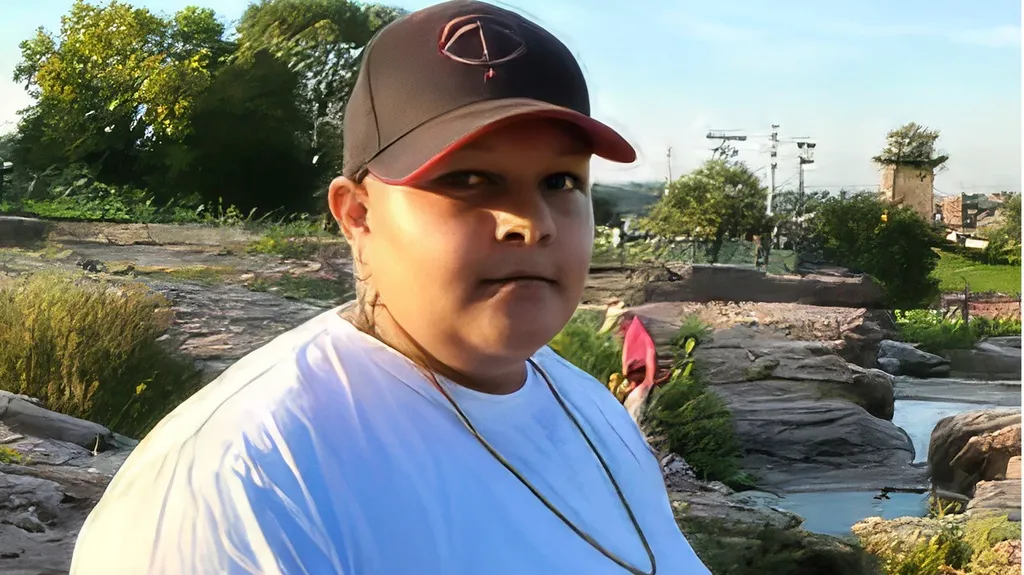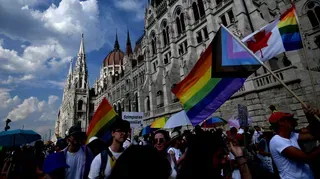December 19, 2013
Queer Women's Film Project Showcases Racial Divide
Kilian Melloy READ TIME: 4 MIN.
"Toasted Marshmallows" is a film, performance, and community-building project created by two mixed-race queer women of color who've identified a gap in popular culture's representation of mixed-race narratives. Since founding the project in 2012, the co-creators have collected stories from their families and other mixed-race women in New York City, Chicago, Washington, D.C., Portland, Vancouver, and in August, in Oakland. Next on their destination list - Sri Lanka.
Anoushka Ratnarajah, the daughter of a Sri Lankan father and white Canadian mother, is a brown mixed-race femme who grew up in a suburb of Vancouver. Marcelitte Failla, a black mixed-race femme, is from a rural Oregon town known for its surrounding tree nurseries. Growing up in white environments, Ratnarajah and Failla knew they were people of color, but neither understood yet what kind of people of color they were. One race, one culture, one identity did not define them, and that set them apart from the other children they grew up with.
"I'm very light," Failla, 27, said, "but I knew I was brown in this white context. At the same time, it was hard for me to identify as black because I didn't know black people could look like me. My mom was black, but me, I was just a shade of something."
Similarly, Ratnarajah's upbringing was littered with experiences of being othered, too.
"When I was a teenager, I knew I wasn't a desirable young woman because I wasn't white," Ratnarajah, 27, said. "The moment I knew it was going to impact me for the rest of my life was when I didn't get a part in a community play because I was 'too dark.' I went home and cried to my [white] mom who had no idea what to say."
Upon meeting in 2012, both as fellows in the New York City-based Hemispheric Institute for Performance and Politics' Emerging Artist Program, the two shared their experiences with each other - the day a very young Ratnarajah witnessed her brown father called "dirty" in the local grocery store, the time Failla's first childhood friend told her she had "hair like a horse," and also, how it's felt to sometimes be the darkest person in a room, or the lightest.
They put together a funny, honest, and poignant performance piece for the emerging artists' program and called it Toasted Marshmallows; a simple, yet fitting, euphemism for their parallel experience.
"The name just happened," Failla said. "It symbolizes our feeling of being white on the inside, brown on the outside. We're not 'Oreos,' but sometimes we feel like we don't have a connection to our brownness, or our cultures."
Discussing the differences between their experiences has been necessary, too. For Ratnarajah, transnational identity has been especially important to highlight. Many mixed-race people are children of immigrants, or are immigrants themselves.
"My father is Sri Lankan by ancestry but was born in Malaysia," Ratnarajah said. "He immigrated to the U.K. for school where he met my mother, and then to Canada much later after they'd been married for over a decade."
For Failla, talking about how passing for white has complicated the claiming of her identity, has felt essential.
"I pass," Failla said. "People see me as white. In white spaces, people see me as the safe black person, the one they can say offensive things around. In black spaces, it's a question of whether I'm black enough. I've been accepted to some extent but some people still question my authenticity, which complicates the way I feel about being in those spaces."
Collection of Interviews
Today, Toasted Marshmallows exists as a collection of interviews Ratnarajah and Failla are currently making into a feature-length documentary film that intentionally builds on the existing but limited work about mixedness in the arts, and also addresses issues of race, culture, color, privilege, ancestry, transnational identity, belonging, and love.
In January, Toasted Marshmallows is traveling to Sri Lanka with Ratnarajah's father to explore her cultural and familial history, and the women have created an Indiegogo campaign to collect funds from supporters willing to donate to the trip's expenses. The crowdfunding campaign has a goal of $6,000 and ends January 6. As of this week, nearly $200 has been raised.
"We want to be able to document our different homecoming experiences," Ratnarajah said, "and to explore what it means to go to your place of ancestry. Neither my father nor I have been there before. We're excited about what this will add to the film."
While the two were in Oakland this summer, they interviewed three queer-identified mixed-race women, one of whom was Nia King, an established freelance writer and producer of "We Want the Airwaves," a podcast in which she interviews emerging queer and transgender artists of color. For King, participating in conversations around mixed-race experiences to dispel harmful tropes and ignorant preconceptions has been crucial.
"I'm excited about the Toasted Marshmallows film because it's an opportunity to showcase the diversity and complexity of mixed-race women's experiences," King told the Bay Area Reporter. "We are not all 'tragic mulattoes,' nor are we harbingers of a post-racial utopia."
While Toasted Marshmallows is not explicitly queer-centered, Ratnarajah and Failla have interviewed primarily other queer mixed-race women, which sheds light on how queerness and mixedness can relate.
"There's an understanding amongst queer people of being in that 'in-between' space," Failla said, "existing in the fluidity between gender or relationship norms, that's similar to racial ambiguity."
As they continue to delve into their own personal truths, and those of other mixed-race women, Toasted Marshmallows has widened the scope of collective mixed-race consciousness and visibility, the women said.
"I hope this project creates more space for people to talk," Failla said. "People are feeling their experiences validated, and that it's important to complicate conversations around race, not reduce it to 'all mixed-race people are beautiful' and 'we're all going to eventually end up brown anyway.'"
And complicating conversations around race, Ratnarajah added, can lead to real social change.
"For me," she said, "political queerness and mixedness are an important combination. I don't want to be assimilated into a society with unfair power structures. I'd rather use my identity to challenge those things. Being mixed is a flag of difference that enables you to challenge old notions of race. Because we're not supposed to exist, we have to exist extra hard."
For more information, visit http://toastedmarshmallowsproject.com/
To help Toasted Marshmallows get to Sri Lanka, visit http://www.indiegogo.com/projects/toasted-marshmallows-goes-to-sri-lanKa
Kilian Melloy serves as EDGE Media Network's Associate Arts Editor and Staff Contributor. His professional memberships include the National Lesbian & Gay Journalists Association, the Boston Online Film Critics Association, The Gay and Lesbian Entertainment Critics Association, and the Boston Theater Critics Association's Elliot Norton Awards Committee.






